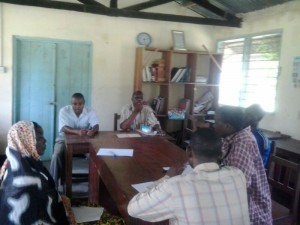Utete, TZ – District Livestock Officer visits cow groups – 28 Feb 2014
The cow projects in Kindwitwi got off to promising starts but have started to run into trouble. The MOM family is getting about five liters of milk per day from their cow. While this provides a good income boost, it is only about half of the anticipated milk production and it will make it difficult for the family to repay its loan while being able to take a small income away to improve their lives.
The Mamas Group has had even more trouble, as their cow has gone down to producing only one liter of milk per day. The cow is pregnant again, which means it should experience a boost in milk production in the next few months, but the current low production is very unusual. Potential problems include insufficient food, poor food quality, insufficient water, poor water quality, improper milking techniques, illness, and a number of other factors.
Since beginning the project the two groups have been saving money to pay for veterinary visits. On the 28th, Mr. Juma, the District Livestock Officer, visited the groups in Kindwitwi to assess the projects and provide advice for improving milk yields.
He attributed the MOM’s cow’s low production to the stress of losing her calf. The calf died in an accident months ago and the mother’s milk production never returned to previous levels. Happy cows are productive cows, so the stress of losing her calf greatly affected the mother’s ability to produce milk.
He attributed the Mamas Group’s low production to a few factors, most importantly was that the cow is pregnant again so milk levels will be low until the time of birth.
For both groups Mr. Juma suggested increasing the amount of food the cows receive and he outlined a diet of corn husks, minerals, salt, and lime (calcium supplement) for them to follow.
Mr. Juma also explained to the groups the importance of maintaining a good pregnancy cycle with the cows. Chotaraa cows need to get pregnant at least once a year to maintain high levels of milk production. It is important for cow owners to understand and identify when their cows need to get pregnant again and whether they require artificial insemination or traditional mating with a bull.
Mr. Juma was very happy with the quality of the cow bandas and with the dedication of the farmers and he expressed his optimism that both groups could get their cows back to desired levels of productivity. Maintaining productivity will be crucial to the groups’ abilities to repay their loans and qualify for further collaboration in the future.


